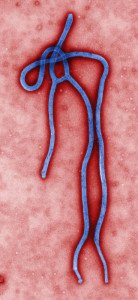The first imported case of Ebola in the US has been confirmed by the Centers for Disease Control and Prevention (CDC) and authorities are monitoring at least five schoolchildren who came into contact with the patient after he became sick and infectious.
 The patient came to the United States from Liberia on 20 September aboard a commercial airliner and was admitted to a hospital in Dallas, Texas, four days later.
The patient came to the United States from Liberia on 20 September aboard a commercial airliner and was admitted to a hospital in Dallas, Texas, four days later.
Officials say that he had shown no symptoms of the disease while on the flight and that he had posed no threat to other passengers. However, they believe that he came in contact with at least 12 to 18 people when he was experiencing symptoms, including relatives and hospital staff – of which none so far have been confirmed as infected.
Associate Health Minister Jo Goodhew explains in a press release that New Zealand is well placed to detect and respond to Ebola if it were to reach the country.
“The Ministry of Health assessment is that the risk to New Zealand from Ebola remains low,” she says.
Our colleagues at the UK and Australian SMCs have collected the following expert commentary. Feel free to use these quotes in your reporting. If you would like to contact a New Zealand expert, please contact the SMC (04 499 5476; smc@sciencemediacentre.co.nz).
Prof David Heymann, Professor of Infectious Disease Epidemiology, London School of Hygiene & Tropical Medicine, comments:
“Ebola is relatively easy to contain as long as you isolate any suspected cases and maintain good clinical practices to prevent onward transmission. US hospitals have good infection control measures in place, which involve isolating fevers of unknown origin, and using good clinical practices. It is also fairly easy and straightforward for US authorities to trace any contact the patient may have had, and to put contacts under fever surveillance. If these people then develop a fever, that would be diagnosed, and if Ebola, they would also be isolated, and their contacts traced. So as long as these systems are maintained, we don’t need to worry about a major Ebola outbreak occurring in the US. The same activities that will contain Ebola in the US will also stop the outbreaks in Africa if applied effectively.”
Dr Brian McCloskey, Director of Global Health at Public Health England, comments:
“It is not unexpected that an imported case of Ebola has been seen in the US and it underlines the need for the UK to remain alert. However, it’s important to remember that even if cases are identified here, we have robust, well-developed and well-tested NHS systems for managing unusual infectious diseases.
“The risk of travellers and people working in affected countries contracting Ebola remains low, but PHE continues to keep border staff and medical practitioners informed, and request they remain vigilant for unexplained illness in those who have visited these areas in West Africa.”
Prof Tom Solomon, Director of the UK’s Health Protection Research Unit in Emerging Infections based at the University of Liverpool, comments:
“This is worrying news about the virus’ spread to America for the first time. But in fact work we have been doing at the UK’s Health Protection Research Unit based at the University of Liverpool predicted that America was one of the countries at greatest risk of importing the disease. This was based on our knowledge of airline passenger travel. Although it is worrying that Ebola has spread beyond Africa in this way, the chances of it becoming established in America or other Western Countries is very small; this is because unlike the affected countries in Western Africa, we have well established systems in place which can contain such a disease.”
Prof Jonathan Ball, Professor of Molecular Virology, University of Nottingham, comments:
“The incubation period for Ebolavirus can be up to 21 days, so even with the exit screening that’s currently happening, cases can slip through the net. Some might argue there’s a case to screen people as they enter a non-affected country, but this still wouldn’t pick up all cases.
“Whilst the risk of imported Ebolavirus remains small, it’s still a very real risk, and one that won’t go away until this outbreak is stopped. It’s a reminder to the global community that Ebolavirus isn’t just an African problem.”
Dr Ben Neuman, Lecturer in Virology, University of Reading, comments:
“The one positive thing to remember in this case is that America has the best record at the moment of treating Ebola patients without letting the virus spread. Doctors taking the most sophisticated biosafety precautions will be working now to make sure that the new patient has the best possible chance of recovering. Groups such as Doctors Without Borders have a long and successful track record of treating Ebola patients safely in Africa under far less hospitable conditions, so I am very hopeful that the same can be done in the high-tech hospitals of America.”
Associate Professor Sanjaya Senanayake, a practising infectious diseases physician at the Australian National University Medical School, comments:
“In Texas, the first ‘unexpected’ case of Ebola in the USA has been hospitalised. Few details are known at this stage apart from this person coming from Liberia. Given the continuing outbreak in West Africa and the ready access of people to air travel, it is not surprising that cases of Ebola will emerge in countries outside Africa. However, many countries have been preparing for such an eventuality for months. Also, developed nations have a strong public health and hospital infrastructure; therefore, the appearance of new cases of Ebola in countries like the USA should not be a cause for alarm as they should have the resources to limit the spread of any infection. But this is certainly a reminder for all nations to be vigilant for such cases appearing from the affected region.”